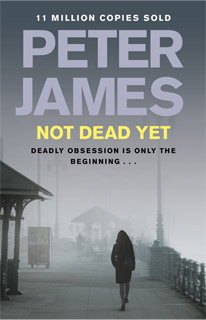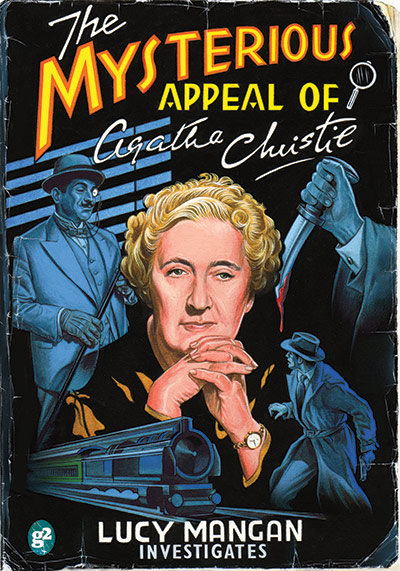You have no items in your cart. Want to get some nice things?
Go shoppingRobin Stevens, who finished a dissertation on crime fiction recently, went to a debate at Kings Place on Monday to listen to John Banville, Sophie Hannah, Peter James and Lee Child discuss whether crime fiction is the new “literary” fiction. She came away with the conclusion that yes, it can be, but that perhaps it shouldn’t have been a question in the first place.

I wrote my MA dissertation on crime fiction.
“Really?” asked my course mates when I told them, a wistful expression on their faces. “That sounds so fun.”
“Really,” said most of my other friends and relations suspiciously. “That sounds so… fun.”
Hear the difference? The second is riddled with hidden meaning. What, no French-sounding critics? No complex texts in translation about the inevitability of loss and the beauty of pain? No Great Big Novels by Serious Victorian Men? I was wasting my academic potential on books that were not even proper literature.
Crime novels, after all, are written for people whose other principal source of reading material is the Daily Mail. Anyone else who has the misfortune to like those naughty, bloody, fun stories must do so in the privacy of their own home, and make sure they feel guilty about it afterwards. Even some of the actual critics I referenced in my dissertation felt this way. They analysed Agatha Christie as though they were holding her books up at arm’s length and squirting them with Cillit Bang to wash all of that dirty murder away and reveal the nice clean literature that they suspected might be lurking underneath.

Obviously, I think this viewpoint is ragingly stupid, and so I was delighted to hear a panel of Real Crime Novelists™ agree with me. At an event at King’s Place, London, earlier this week, John Banville, Sophie Hannah, Peter James and Lee Child came together to discuss the place of crime fiction in Britain today, and to answer the question of whether crime fiction can ever be “literary”.
What these authors have to say should carry some weight. They’re among the greats of current British crime, and coincidentally, three of them are now on the shortlist for the 2012 National Book Awards Crime & Thriller of the Year. And they’re all vocal about the value of crime writing.
Lee Child kicked off the discussion by stating—refreshingly—that there’s absolutely nothing wrong with having a large readership. Mass market appeal is the stick most commonly used to beat crime fiction with but, as Child says, it’s actually fairly difficult to write a story that will interest twenty-year-olds and eighty-year-olds, truck drivers and barristers. That crime fiction can do this is a testament not only to its power as a genre but to the craft of individual writers. After all, what is crime fiction? Just fiction that has a crime in it. There’s nothing in that basic description to intrinsically suggest that all works of crime fiction are going to be trash, and as such crime writers should stop apologising for their good writing and their genre’s success.
It’s clear that these four writers are both thoughtful and positive about their genre and their readership. To Banville, we live in an instant rather than a dumbed-down age. Readers are just as intelligent as they ever were—and, as James perceptively pointed out, past generations don’t deserve a lot of the “literary” credit they’re given. Dickens and Shakespeare, after all, were the populists of their day, writing to a huge audience. By implication, today’s Dickens analogues are not the Martin Amises and Salman Rushdies of the literary world, but the crime writers. It’s a viewpoint that I both like and fully get behind.
All four authors agreed, though, that they’d encountered crime fiction snobbery both from other writers and from their own readers. Hannah told a story about being approached by a woman at a signing who told her that she was such a good writer that she ought to try her hand at a “proper” book. Ouch. But, she added wryly, all those backhanded compliments have left her convinced that the anti-crime snobs are just people who are insecure about their own intelligence. The really clever people just calmly get on with writing and reading whatever they please, without worrying what their choices say about them.
That may be a carefully rehearsed line, but to me it rings true. After all, Dorothy Sayers translated Dante; Frank Tallis is a clinical psychologist; Anne Holt had a brief spell as the Norwegian Justice Minister; and Banville himself, when he’s not writing crime fiction under his Benjamin Black pseudonym, is a prizewinning author of “literary” fiction. Quite obviously, none of these people are stupid. Listening to the panellists speak, too, confirmed something for me that I’ve believed for a long time. All those tropes that crime fiction is pilloried for—the unchangeable nature of its often stock characters, its repetitive plot lines—are not random insertions. On the contrary, they are carefully considered and carefully employed by their authors for maximum effect.
Child was particularly clear about this. To make a series popular, he told the audience, you need to actively avoid any kind of meaningful character arc for your hero. Child goes out of his way to ensure that his protagonist Jack Reacher never experiences an emotional journey. He wants his readers to be able to pick up any Reacher novel and immediately feel comforted, secure in the solidity of their hero’s moral compass. Hannah added that these “one-dimensional” and “static” crime novel characters might actually be a fairly truthful depiction of many human beings. After all, she pointed out, in real life people don’t learn things. And even those neat solutions that must come at the end of every crime novel aren’t as divorced from reality as they might seem. After all, doesn’t the seemingly unlikely or impossible often happen six times before breakfast?
 As a fan of—and, after my crime-fiction dissertation, an expert on—the novels of Christie, Sayers and their contemporaries, this brought up an interesting point for me: present-to-past crime writer snobbery. Warmth, continuity and stasis? Sounds like a classic crime novel. But Banville and James, at least, were adamant that Christie lacks an essential something that they have tried to put into their own fictions. To Banville, she misses a “sense of lived life”, and James agrees that she is hopelessly formulaic. If that’s the case, though, what about all those people still reading Christie’s books so many years after they were first published? Are they lacking in discernment? And if they’re not, isn’t this really the same kind of snobbery Banville and James denounce when it’s directed at them? There’s a double standard here, and it’s one I’ve noticed before.
As a fan of—and, after my crime-fiction dissertation, an expert on—the novels of Christie, Sayers and their contemporaries, this brought up an interesting point for me: present-to-past crime writer snobbery. Warmth, continuity and stasis? Sounds like a classic crime novel. But Banville and James, at least, were adamant that Christie lacks an essential something that they have tried to put into their own fictions. To Banville, she misses a “sense of lived life”, and James agrees that she is hopelessly formulaic. If that’s the case, though, what about all those people still reading Christie’s books so many years after they were first published? Are they lacking in discernment? And if they’re not, isn’t this really the same kind of snobbery Banville and James denounce when it’s directed at them? There’s a double standard here, and it’s one I’ve noticed before.
Today’s crime fiction authors often seem a bit nervous about connecting themselves to the past of their genre. Many novelists spend a lot of time insisting that they are doing something entirely new, and I find this puzzling. Yes, you can always put new twists on your material, and I believe that Banville, Hannah, James and Child all do just that, but the material itself is some of the oldest around. Someone murders someone else and a third person solves it? I’ve heard that one before.
It seems to me that this essential unchangeability is the real key to the popularity and relevance of crime fiction. Readers are absolutely on board with the basics of what they know they’re going to get, and because of that a crime writer has more leeway to do their own thing, show their creativity and cultivate a unique voice. Like a lot of supposedly constraining things, crime fiction is an incredibly liberating genre, and those people who have the wit and talent to make something surprising out of the oldest of materials tend to be very good writers.
Crime fiction doesn’t and shouldn’t mean more or less than any fiction which centres around a crime. What was brought home to me on Monday night was how disparate the four writers I listened to were. Each has their own style of writing and their own often widely varying intentions. But they are all connected by the basic conventions of genre in which they write, and that genre, by its very nature, will always essentially be about comfort and continuity in the face of horror. I came away from the panel feeling that crime writing in Britian is in rude health, in the hands of a talented group of individuals who use the genre to write clever, thought-provoking and often great novels—and there’s nothing new about that. Hannah, Banville, James and Child are all writing very different variations on a theme, a theme that hasn’t changed since long before Christie wrote her novels.

About Robin Stevens
Robin started out writing literary features for Litro and joined the team in November 2012. She is from Oxford by way of California, and she recently completed an English Literature MA at King's College, London. Her dissertation was on crime fiction, so she can now officially refer to herself as an expert in murder (she's not sure whether she should be proud of that). Robin reviews books for The Bookbag and on her own personal blog, redbreastedbird.blogspot.co.uk. She also writes children's novels. Luckily, she believes that you can never have too many books in your life.





Hello Robin,
I read your views about crime fiction.
I am from INDIA and also writing my dissertation on crime fiction in Australian Literature.
Will you please send me the structure of your dissertation?
Thanking you.
This article is novel, I really love it. I also have some ideas written in my article, you can have a look if you have the interest. We can also discuss different topics.
Model Baju Korea Terbaru | Doel Gembel | bursa lowongan kerja surabaya